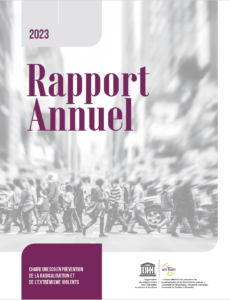OUR ANNUAL REPORTS
The UNESCO-PREV Chair’s annual reports provide a comprehensive overview of its organizational structure; its latest statistics; its actions, activities and impacts; its financial partnerships and its grants.
2024 ANNUAL REPORT
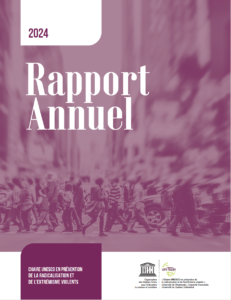 In 2024, against a backdrop of crises, conflicts, uncertainty and social polarization, the UNESCO-PREV Chair continued its work and adapted its approaches in an attempt to better understand and prevent these phenomena in Quebec and Canada, as well as internationally.
In 2024, against a backdrop of crises, conflicts, uncertainty and social polarization, the UNESCO-PREV Chair continued its work and adapted its approaches in an attempt to better understand and prevent these phenomena in Quebec and Canada, as well as internationally.
The Chair thus pursued its research program on extremist movements, conspiracy theories, climate disinformation, hate speech targeting minorities, the evaluation of programs to prevent violent extremism and the scope of training in media education, information and critical thinking, approaches to promoting democratic dialogue and the consequences of research on these sensitive subjects. The Chair also consolidated its monitoring team, which observes and collects data on socionumeric networks in Quebec, Canada and the United States, in order to be ever more reactive to radical discourse and certain events likely to generate tension and polarization. Finally, the Chair has collaborated on numerous other research projects and participated in a significant number of publications and scientific activities.
In 2024, members of the Chair continued to take part in numerous training, awareness and knowledge transfer activities with our partners in Quebec, Canada and internationally. This year, the Chair decided to play an even more active role in training undergraduate and postgraduate students on issues related to radicalization, violent extremism and prevention. In view of societal and professional needs, this will be one of the priority pillars of its work in the coming years, along with scientific mediation. The members of the Chair have stepped up their involvement at various levels with the governments of Quebec and Canada, as well as certain international collaborations. The Chair also pursued its community involvement through a number of activities organized by its members. Last but not least, it has maintained a sustained presence in the media to promote the transfer of knowledge to the general public.
The Chair is proud to have succeeded, in 2024, in consolidating its team, pursuing its activities steadily, developing an ever more proactive approach and contributing to the international influence of Quebec and Canadian expertise.
As always, we would like to thank our committed and passionate team members, our universities and all our partners – academic, governmental and practical – who renew their trust in us every year. We are proud to say that we will continue to work, in our own small way, to strengthen peace and trust at home and abroad in the years to come.
To consult the 2024 annual report , click here.
*This year’s annual report is available in French only*
2023 ANNUAL REPORT
The social tensions and various crises we have been experiencing in recent years are set to multiply as a result of the risks and conjunctures we are observing: social and political crises, climate change, armed conflict, the growing production of goods and services and the digitization of society are just a few examples. Our research has shown that these moments of vulnerability are conducive to polarization and misinformation.
In 2023, the Chair continued to work on sensitive topics such as hate speech and misogyny, disinformation, conspiracy and violent extremism in Quebec, Canada, but also in other regions, such as the Sahel. She has also looked at how specific populations react to conspiracy theories, and developed new projects to address sensitivities observed by her team, including climate misinformation and misinformation about gender and sexual minorities.
The Chair has taken an interest in the role of experts in society, and in the tensions that can arise from work on sensitive subjects. This has led our team members to research the impacts, effects and consequences of the Chair’s communication on research into extremism on the dynamics of democratic dialogue, and to study the professional and personal risks experienced by young researchers working in these polarized contexts. Finally, to better equip societies in the face of growing tensions, we are continuing to evaluate prevention programs with the PREV-Impact project and with our research into the scope of training in media education, information and critical thinking. The Chair’s Media Unit is continuing its work on media coverage of radicalization and terrorism.
In 2023, members of the Chair continued to take part in numerous training, awareness-raising and knowledge transfer activities with our partners in Quebec, Canada and internationally. Chair members were involved at various levels with the Government of Quebec and the Government of Canada, notably at the fourth international conference of the Canadian Centre for Community Engagement and Violence Prevention, held in Ottawa in May 2023. The Chair also pursued its community involvement, notably through the Someone project. It also maintained a sustained presence in the media to promote the transfer of knowledge to the general public. Finally, the Chair continued its collaboration within the UNESCO and Francophonie communities.
To consult the 2023 annual report, click here.
*This year’s annual report is available in French only*
2022 ANNUAL REPORT
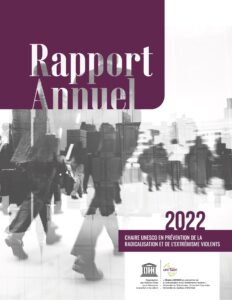 The year 2022 marked the beginning of the second mandate of the UNESCO-PREV Chair. This year has therefore allowed us to take stock, to maintain continuity in some projects and to introduce new ideas in others. Although it has gradually diminished in intensity, the effects of the pandemic crisis have continued to be felt in many parts of the world. In so doing, it has confirmed the importance of our mission: how to understand in order to better prevent radicalization, social polarization and violent extremism? In this context, the UNESCO-PREV Chair has had another particularly active year in Quebec, Canada and internationally.
The year 2022 marked the beginning of the second mandate of the UNESCO-PREV Chair. This year has therefore allowed us to take stock, to maintain continuity in some projects and to introduce new ideas in others. Although it has gradually diminished in intensity, the effects of the pandemic crisis have continued to be felt in many parts of the world. In so doing, it has confirmed the importance of our mission: how to understand in order to better prevent radicalization, social polarization and violent extremism? In this context, the UNESCO-PREV Chair has had another particularly active year in Quebec, Canada and internationally.
The Chair has maintained its mapping of poles of expertise and its bank of experts on the prevention of violent radicalization and extremism. It has also continued to develop its online activity through its social network accounts. These tools are increasingly consulted here and internationally. This networking has also resulted in an increase in collaborations and joint activities, many of which were marked by a return to face-to-face meetings, with its partners in government, academia and practice in Quebec and Canada. Internationally, the Chair has collaborated on various projects with several partners, starting with UNESCO and the OIF, and in several countries.
The Chair has deepened its action research programs. It has continued its activities on the evaluation of prevention programs. It has also developed its research on disinformation, conspiracy and violent extremism in Quebec, Canada, but also in the Sahel. In addition to several research reports, Marie-Eve Carignan and David Morin have published a book, Mon frère est complotiste. Comment rétablir le lien et le dialogue social (Les Éditions de l’Homme), which received wide media coverage here and in France. In addition, the Chair has continued to work on the issue of media coverage of radicalization and terrorism. It also collaborated on several research projects conducted by partners. Finally, the Chair has continued its scientific activities and publications.
To consult the 2022 annual report, click here.
2021 ANNUAL REPORT
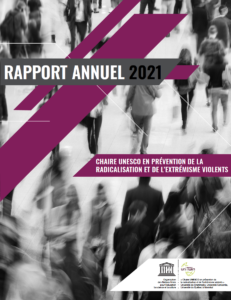 For the UNESCO-PREV Chair, as for many around the world, the year 2021 has followed the previous one on the path of adaptation and resilience in the face of the Covid-19 pandemic. This period of crisis has not resulted in a decrease in radicalization, hate speech, misinformation and violent extremism. Far from it. In this context, the UNESCO-PREV Chair has continued its activities in Quebec, Canada and internationally.
For the UNESCO-PREV Chair, as for many around the world, the year 2021 has followed the previous one on the path of adaptation and resilience in the face of the Covid-19 pandemic. This period of crisis has not resulted in a decrease in radicalization, hate speech, misinformation and violent extremism. Far from it. In this context, the UNESCO-PREV Chair has continued its activities in Quebec, Canada and internationally.
The Chair has expanded its mapping of expertise and its bank of experts in the prevention of violent radicalization and extremism. It has also intensified its online activities through its social networks in order to publicize its activities and those of its partners. Despite travel limitations due to the pandemic, the Chair has continued its collaborations and joint activities (at a distance) with its governmental, academic and practice partners in Quebec and Canada. Internationally, the Chair collaborated on various projects with its partners, including UNESCO, the OIF, NATO and in several countries in Europe, Africa and Latin America.
The Chair has also continued its action-research programs. Its PREV-IMPACT Canada program on the evaluation of programs for the prevention of violent extremism has, among other things, resulted in the publication of two study reports on the issue, available online. The Chair has also advanced its research on disinformation, conspiracy thinking and violent extremism in Quebec, Canada and in a comparative international perspective. With its African and Belgian partners, the Chair has completed a major research project on prevention mechanisms in the Francophone space, mandated by the Organisation internationale de la Francophonie and the FrancoPREV network, which will be officially submitted in 2022.
To consult the 2021 annual report, click here.
2020 ANNUAL REPORT
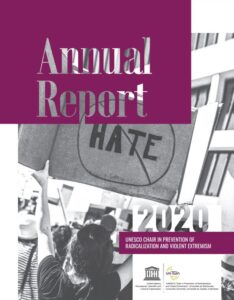 For the UNESCO-PREV Chair, as for everyone around the world, the watchwords for this year 2020 have been adaptation and resilience in the context of the global Covid-19 pandemic. At the same time, this crisis has confirmed the importance of our mission: how to prevent radicalization and violent extremism?
For the UNESCO-PREV Chair, as for everyone around the world, the watchwords for this year 2020 have been adaptation and resilience in the context of the global Covid-19 pandemic. At the same time, this crisis has confirmed the importance of our mission: how to prevent radicalization and violent extremism?
While solidarity actions have multiplied, there has also been a proliferation of misinformation, messages of hatred and intolerance and violent extremist ideologies of all kinds. The crisis has fuelled and reinforced an already well-established global trend. In this context, the Chair once again experienced a particularly active year in Quebec, Canada and internationally.
The 2020 programming, presented in our 2020 Annual Report, outlines the main projects carried out during this year. Although the Chair had to postpone several events, including three major national and international conferences, it was able to rethink the format of certain activities.
For example, it offered its first massive open online course “From Hate to Hope” and developed a new toolkit on racial and social profiling.
To view the UNESCO-PREV Chair’s 2020 Annual Report, click here.
2019 ANNUAL REPORT
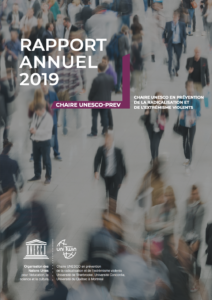 2019 was a very active year for the UNESCO-PREV Chair in Québec, in Canada and at the international level. Throughout this second year, our main challenges were the implementation of the Chair and the structuring of its national and international networks. We faced these challenges while pursuing our research projects that were already in progress and carrying out our teams’ activities within our institutions.
2019 was a very active year for the UNESCO-PREV Chair in Québec, in Canada and at the international level. Throughout this second year, our main challenges were the implementation of the Chair and the structuring of its national and international networks. We faced these challenges while pursuing our research projects that were already in progress and carrying out our teams’ activities within our institutions.
The 2019 programming, shown in our 2019 Annual Report, includes structuring actions, such as the stabilization of the Chair’s team and the launch of our website, as well as the creation of social network accounts, a mapping of centres of expertise in prevention of radicalization and violent extremism, and a bank of associate members, which is now regularly updated.
For the UNESCO-PREV Chair, 2019 saw the launch, the pursuing or the completion of several large-scale research and action research projects, as evidenced by our numerous scientific publications.
The Chair also co-organized various events, including two major international conferences, in Ottawa and in Rabat, Morocco, which promoted Québec and Canada’s expertise abroad. Lastly, we continued taking part in a number of training, awareness and knowledge transfer activities.
To read the UNESCO-PREV Chair’s 2019 Annual Report, click here.
Please note that the report is only available in French.
2018 ANNUAL REPORT
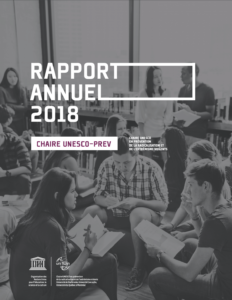 Officially launched on February 23rd, 2018, the UNESCO-PREV Chair had a very busy year in Québec, in Canada and at the international level. For our first year of existence, our main challenge was to take on the Chair’s implementation, to start the structuring of its national and international networks and to launch new research projects, while pursuing our teams’ activities among our institutions and the search for financing.
Officially launched on February 23rd, 2018, the UNESCO-PREV Chair had a very busy year in Québec, in Canada and at the international level. For our first year of existence, our main challenge was to take on the Chair’s implementation, to start the structuring of its national and international networks and to launch new research projects, while pursuing our teams’ activities among our institutions and the search for financing.
The 2018 programming, shown in the report which spreads to the beginning of 2019, includes structuring actions such as the recruitment of a coordinator and team members, the planning of our website and social network accounts, the progressive implementation of internal structures, as well as the first steps of a global mapping of expertise in prevention of radicalization and violent extremism and an international database of experts, which will both be enriched in the upcoming years.
The report also includes several major research projects and scientific publications. Lastly, our team took part in a number of training, awareness and knowledge transfer activities.
To read the UNESCO-PREV Chair’s 2018 Annual Report, click here.
Please note that the report is only available in French.

